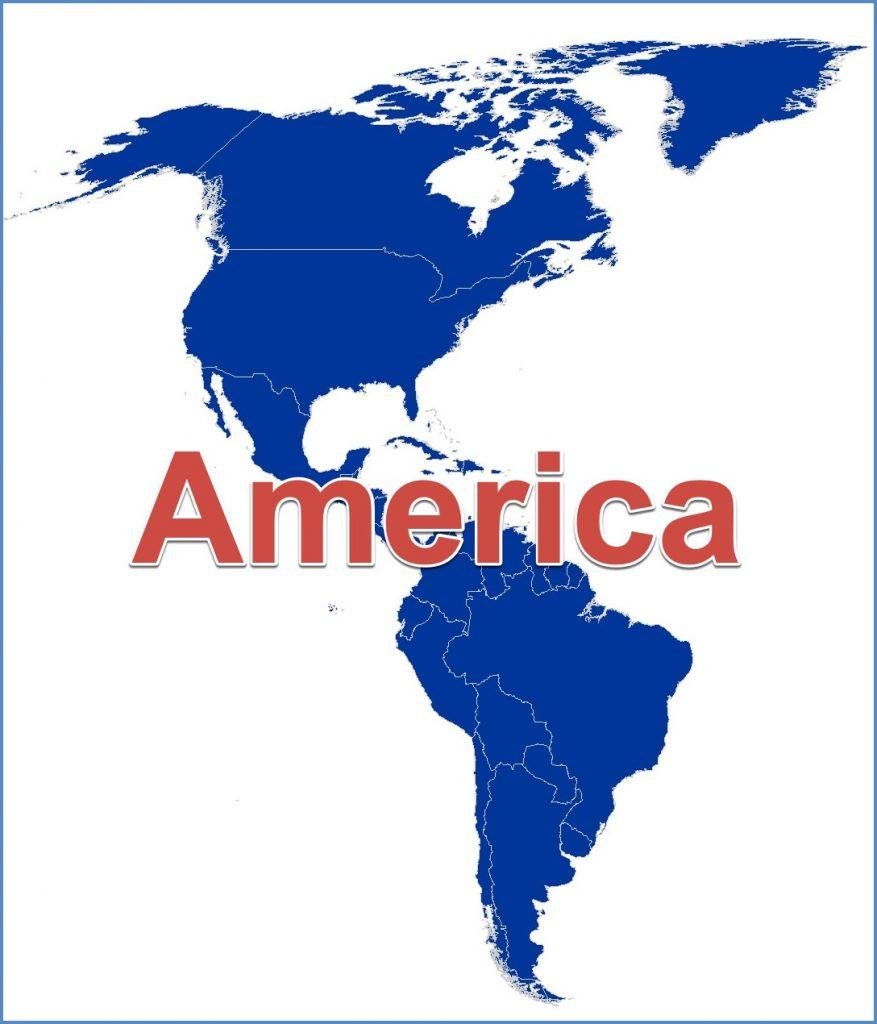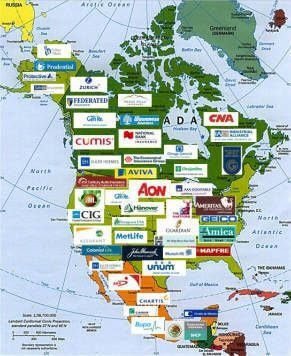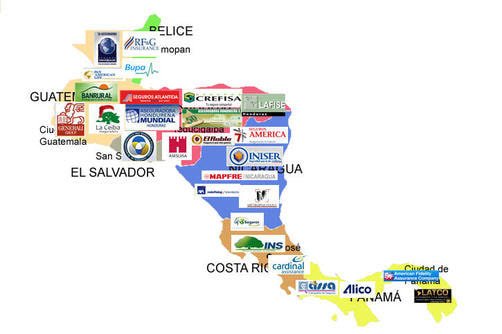
World Insurance Companies Logos – List of American Insurance Companies. Click on the map of North America, South America or Central America to access the countries in those continents.
In each selected area, you will find the logos and links to access the insurers of that country.
American Insurance Companies: Logos & Key Profiles
List of American Insurance Companies Logos. Please click on the map for each continent to access the company logos of the chosen country and find the best insurer based on costs, coverage, customer service, and claim support. We aim to help you find a trusted coverage provider.
American Insurance Company Logos and Names Country by Country

The image displays a map of North America featuring logos and names of insurance companies headquartered in North America, specifically the United States.
Get logos and names of insurers from every North American country.

The picture shows a map of South America with logos and names of insurance companies based in South America.
Get logos and names of insurers from every South American country.

This picture shows a map of Central America with logos and names of insurance companies based in Central America.
Get logos and names of insurers from every Central American country.
Obtain the logos and names of insurers from every country in Africa, Asia, Europe, the Caribbean, and Oceania. Insurance Company Logos page.
Largest Insurance Companies in America
There are many insurance companies operating in North America, offering a wide range of products and services to individuals, businesses, and other organizations.
Below is a list of the largest insurance companies, based on their total assets and revenue:
State Farm: A mutual insurer based in the United States that provides auto, home, life, and health insurance products.
Allstate: An American insurer that offers a range of products, including auto, home, life, and business insurance.
Berkshire Hathaway: A multinational conglomerate holding company based in the United States that owns a range of insurance companies, including GEICO, National Indemnity Company, and General Re.
Progressive: An American insurer that offers auto, home, and business insurance products.
Travelers: An American insurer that provides a range of products, including auto, home, and business insurance, as well as specialized industries such as construction and technology.
AIG: An American multinational insurer corporation that offers a range of products, including property and casualty, life, and retirement products.
Chubb: An American multinational insurer that provides a range of products, including property and casualty, accident, health, and reinsurance.
Liberty Mutual: An American diversified global insurer that offers a range of products, including auto, home, and business insurance.
Nationwide: An American mutual insurer that provides a range of products, including auto, home, and business insurance.
Zurich Insurance Group: A Swiss insurer that operates in North America and provides a range of products, including property and casualty, life insurance, and pensions.
How to Select a Good Insurance Company
Find a Good Insurance Company. Some tips to consider when choosing the best insurer.
1 – Find the right coverage.
First, it’s important to gather information about the right coverage, and obtain insurance quotes from, a variety of insurers as part of your overall selection process. In order to do that, begin by determining the type of coverage you need in order to make a right comparison across multiple companies.
Now it’s time to research the types of insurers from which to obtain that coverage.
2 – Check License Status.
Insurers must be licensed by the country in which they sell insurances. For added peace of mind, be sure you’re buying coverage from a licensed provider in your area by checking with the department of insurers of your Country, either online or by phone.
3 – Check financial stability.
Finding out the financial stability of an insurer. One can research a provider’s insurance, financial strength rating, in the websites of companies such as A.M. Best, Standard & Poor’s, Moody’s or Fitch.
While most of the major insurers are safe bets, this is especially helpful when considering smaller, lesser-known providers.
4 – Check customer service and claims support.
Check consumer complaint ratios. Many departments of Insurance websites publish consumer complaint ratios for the providers.
A consumer complaint ratio tells you how many complaints an insurer received for every 1,000 claims its policyholders filed.
It’s also a good idea to check a company’s complaint ratio in several other countries for a company might have great ratings in one, but not-so-great ratings in another.
For added protection, look for companies with low consumer complaint ratios in a variety of countries.
Locate the Insurance Companies in the World you trust.
The Americas
Are lands in the Western Hemisphere that are also known as the New World, they cover 8.3% of the Earth’s total surface area (28.4% of its land area)?
The topography is dominated by the American Cordillera, a long chain of mountains that run the length of the West Coast. The flatter eastern side of the continent is dominated by large river basins, such as the Amazon, Mississippi, and río de la Plata.
Extending 14,000 km (8,699 mi) in a north-south orientation, the climate, and ecology vary strongly across the continent, from the arctic tundra of Canada, Greenland, and Alaska, to the tropical rainforests in Central and South America.
When the continents joined 3 million years ago, the Great American Interchange resulted in many species being spread across the continent, such as the cougar, porcupine, and hummingbirds.
Humans first settled the continent from Asia between 40,000 BCE and 15,000 BCE. The second migration of Na-Dene speakers followed later from Asia.
The subsequent migration of the Inuit into the new arctic around 3500 BCE completed what is generally regarded as the settlement by the Indigenous peoples of the Americas.
The voyages of Christopher Columbus from 1492 to 1502 resulted in permanent contact with European (and subsequently, other Old World) powers, which led to the Columbian exchange.
Diseases introduced from Europe and Africa devastated the Indigenous peoples, and the European powers colonized the Americas.
Mass emigration from Europe, including large numbers of indentured servants, and forced immigration of African slaves largely replaced the Indigenous Peoples.
Beginning with the American Revolution in 1776 and Haitian Revolution in 1791, the European powers began to decolonize the Americas.
Currently, almost all the population of the continent resides in independent countries; however, the legacy of the colonization and settlement by Europeans is that the Americas share many common cultural traits, most notably the predominant adherence to Christianity and the use of Indo-European languages; primarily Spanish, English, and Portuguese.
More than 900 million people live in the Americas (about 13.5% of the human population), the most populous countries being the United States, Brazil, and Mexico, the most populous cities being Mexico City, São Paulo, and New York City.
American Insurance Company Logos – World insurance Companies Logos.
 Skip to content
Skip to content